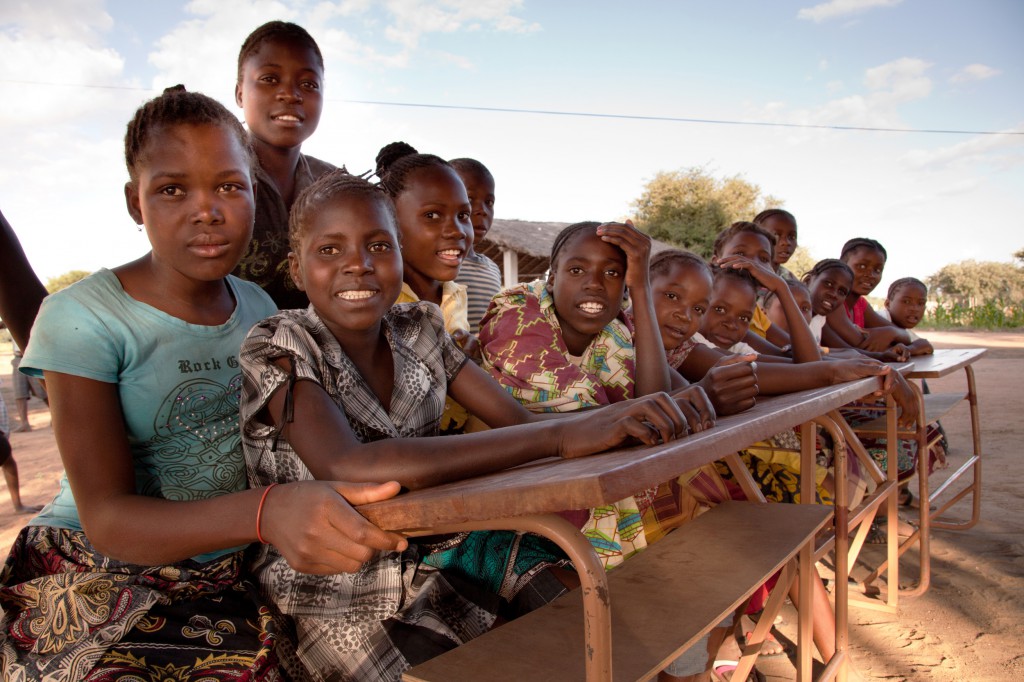
Thanks to your support, Caritas Australia funds the Matuba Children’s Centre. This Centre provides education, food and life skills for orphaned and vulnerable children like Ditosa, 12.
Ditosa lives in the village of Matuba, near Chokwe in Mozambique. Her parents died of AIDS-related illnesses, so Ditosa and her little sister, Fique, 7, are cared for by their grandmother and aunt who are both HIV positive and too weak to work.
An extremely poor community, most of the houses in Matuba are built of mud bricks. There is no sewage system, so the toilets are deep holes in the ground surrounded by reed screens.
Until two years ago, Ditosa’s family had to walk 2km to collect water from a water pump. Now, with one installed in the village, there are two taps which dispense clean water for the community.
Without having to walk such a long way to collect water, Ditosa’s daily routine is now much simpler. On the days she attends school, she enjoys sharing what she has learnt with her grandmother.
“I like my grandmother because she takes care of me; she helps me wash and gives me clothes,” said Ditosa.
Many children in this area have lost one or both parents to AIDS.
In Mozambique, an estimated 11.5 per cent of adults live with HIV and there are approximately 670,000 children aged 0-17 orphaned to AIDS (UN 2009). In Matuba, the proportion of people with HIV is even higher.
Five years ago, when Caritas Chokwe offered free HIV tests in Matuba, over 50 per cent of the people who came forward for testing were HIV positive.
“Lots of local people go away looking for work. They contract HIV while they are away and bring it back to the community, and it spreads.
Many are sick and many parents have died of AIDS, leaving children with no food or education,” said Mama Cacilda, Director of Caritas Chokwe.
With a generation missing and many grandparents struggling to provide for grandchildren, the need for a centre for orphaned and vulnerable children was identified in 2007.
Caritas Chokwe coordinated the project and Caritas Australia supplied the funding for the Matuba Children’s Centre.
Here, children learn computer skills and crafts such as sewing and jewellery making, and receive extra help with their study.
The Centre also provides children and family members with anti-retroviral drugs (ARVs) to help manage HIV/AIDS.
There is a chicken house, where they learn how to raise chickens for food and to sell, and a workshed where they learn carpentry and make wooden stools.
The Centre also has a vegetable garden where the children help to grow vegetables to eat and to sell.
In the kitchen, lunch is prepared every day by community volunteers. This is often the children’s only meal for the day.
Hygiene is also an important aspect and, to help with this, a toilet and shower block was installed. “I teach the children that they always must be clean,” said Elvira Mabundi, Centre Coordinator.
Ditosa’s favourite things to do at the Centre are carpentry and jewellery making, and she appreciates the extra help she receives with schoolwork.
“I like coming to the Centre because it helps me. I come to study and I get something I don’t get at school. What I enjoy most is making earrings and necklaces,” she said.
As Ditosa’s grandmother and aunt are both too sick to work, their family depends on the kindness of more distant family members. So the food, medicines and support they receive from the Centre are a lifeline.
With your support, Matuba Children’s Centre opens doors for children and young people. Here, they find hope for the future and a safe place where they can grow.
Your donation to Caritas Australia’s Project Compassion gives expression to the Gospel imperative to pursue justice and help those suffering from poverty and disadvantage in more than 30 countries around the world.
To donate, support or fundraise for Project Compassion 2013, please visit our website at www.caritas.org.au/projectcompassion or phone 1800 024 413.